Вычислительная педагогика: мышление, участие и рефлексия
Автор: Патаракин Евгений Дмитриевич, Ярмахов Борис Борисович
Журнал: Образовательные технологии и общество @journal-ifets
Статья в выпуске: 4 т.21, 2018 года.
Бесплатный доступ
В статье представлено понятие «вычислительная педагогика» и обеспечивающий ее развитие педагогический дизайн как социотехническое проектирование средств и сценариев деятельности, направленное на освоение учащимися умений вычислительного мышления, вычислительного участия и вычислительной рефлексии. Взаимосвязанное формирование вычислительного мышления, вычислительного участия и вычислительной рефлексии представлено на примере организации совместной сетевой деятельности в среде и сообществе Scratch.
Совместная деятельность, вычислительная педагогика, вычислительное мышление, вычислительное участие, учебная аналитика, сообщество
Короткий адрес: https://sciup.org/140238033
IDR: 140238033
Текст научной статьи Вычислительная педагогика: мышление, участие и рефлексия
В определении понятия цифровая педагогика делается акцент на электронной информационной образовательной среде. Сам термин цифровая педагогика подчеркивает необходимость учитывать в педагогическом дизайне цифровых объектов, на которые направлена деятельность и цифровой памяти, в которой сохраняются все действия субъектов образования. В последние годы кроме распространенного понятия «цифровая педагогика» (digital) все чаще используется понятие «вычислительная педагогика» (computational pedagogy) [1–3], где прилагательное «вычислительная» подчеркивает использование общих правил и общего языка, на котором говорят все участники деятельности в цифровой среде, вне зависимости от того являются ли они человеческими или программными агентами. Понятие «вычислительная педагогика» акцентирует внимание на том, что добавляют к учебной деятельности компьютерные программы. На Земле уже сформировалось гибридное сообщество, в состав которого входят люди, компьютеры и компьютерные программы [4,5]. Использование компьютеров и компьютерных программ освобождает человека от необходимости выполнения массы рутинных действий и переносит его деятельность на тот уровень, где она еще остается творческой. С созданием и развитием компьютерных сетей человечество перешло на новый уровень совместной деятельности. Совместная сетевая деятельность требует творческой личности нового уровня. Одно из условий участия в творчестве в цифровой среде – это способность и готовность взаимодействовать с людьми и программами.
В вычислительной педагогике могут быть выделены следующие направления:
-
• социотехническое проектирование средств и сценариев деятельности, направленное на освоение учащимися умений вычислительного мышления (computational thinking) [6–10];
-
• социотехническое проектирование средств и сценариев деятельности, направленное на освоение учащимися умений вычислительного участия (computational participation) [11–13];
-
• социотехническое проектирование средств и сценариев деятельности, направленное на освоение учащимися умений вычислительной рефлексии [14– 16].
Эти направления во многом соответствуют типологии умений, необходимых для успешного участия в совместной сетевой деятельности, основанной на типологии взаимодействий, предложенной А.Л. Журавлевым в рамках динамической концепции совместной деятельности [17]. Отправной точкой анализа совместной деятельности и ее коллективного субъекта является взаимодействие участников совместной деятельности. В основании динамической концепции совместной деятельности находится концептуальный «треугольник», объединяющий три направления:
-
• предметно-направленное взаимодействие (взаимодействие, направленное на изменение предмета совместной деятельности);
-
• субъектно-направленное (взаимодействие, направленное на изменение характеристик индивидуального субъекта совместной деятельности);
-
• организационно-направленное (взаимодействие, изменяющее способы и стиль выполнения деятельности).
Scratch как среда вычислительной педагогики
Нам представляется, что перечисленные направления развития вычислительной педагогики наиболее полно могут быть представлены на материалах языка и сообщества Scratch. Этот выбор основан на следующих положениях:
История и родословная языка: 50 летняя история, наследование философии конструкционизма и лучших особенностей среды Лого, множество успешных потомков – учебных языков визуального программирования) В середине 60-х годов XX века М. Минский, С. Пейперт совершили настоящий переворот в использовании компьютеров, показав, что ученик может контролировать деятельность компьютера и компьютерных агентов, выступать в роли дизайнера [18]. Развитие этого направления было связано с разработкой интерактивного компьютерного дизайна для детей и опиралось в первую очередь на традицию инструментального и исследовательского обучения, обоснованного работами Дж. Дьюи и Дж. Брунера. С. Пейперт разработал подход, в рамках которого использовался обучаемый ребенком компьютерный агент — Черепашка языка Лого. Это была первая работа по внедрению в педагогическую практику принципиально новых агентов-партнеров, при помощи которых люди могли думать и учиться. В дальнейшем это направление послужило основой для формирования направления, в рамках которого были созданы среды, позволяющие ученикам создавать и управлять многочисленными агентами. В книге «Переворот в сознании» Пейперт писал о необходимости «объекта, при помощи которого можно лучше думать». В поведении такого объекта ученик может увидеть свое собственное поведение. Впервые этот подход был воплощен в языке Лого, когда ученик получил в свое распоряжение агента - Черепашку, которой можно было давать простые команды: вперед, назад, направо, налево, повтори и т.д. Из этих простых кирпичиков постепенно складываются значительно более сложные микромиры. Основной методологический принцип, который развивал С. Пейперт и его последователи, состоит в том, что: «Обучение происходит наиболее эффективно, если учащийся вовлечен в создание общественного объекта (public entity), будь то замок из песка, машина, книга или компьютерная программа» [19]. Потомок Лого, Scratch в свою очередь является предшественником для множества современных сред визуального программирования, среди которых Snap!, AppInventor, Blockly, NetBlox и другие.
Массовость и продуктивность сообщества: в 2018 году сообщество Scratch насчитывает более 26 миллионов участников и более 30 миллионов проектов. Язык Scratch является прямым потомком языка Лого и многие особенности этого языка сформировались, как ответ на критику Лого. В частности, значение, которое в Scratch уделяется совместной деятельности, возможностям для обмена цифровыми историями, является ответом на критические замечания М. Минского о том, что «литература начинается не с грамматики и не с правил, а с увлекательных историй, которые привлекают наше внимание и повествуют о вещах, которые имеют для нас значение» [20]. Эти слова в равной мере справедливы для мира историй, книг, театральных пьес, фильмов, музыкальных произведений, игровых партий и компьютерных программ. Учитывая эти критические замечания, создатели Scratch уделили дизайну сообщества, в котором ученики могли бы обмениваться увлекательными цифровыми историями не меньшее внимание, чем дизайну языка программирования [21]. В результате направленных усилий разработчиков в среде Scratch стерта грань между языком и сообществом и участники совместной сетевой деятельности рассматривают сообщество как необходимое условие творческой деятельности.
Возможности освоения цифровой культуры, которые язык и сообщество Scratch открывают для международного и российского образования. Scratch – это объектно-ориентированная среда программирования, в которой блоки программ собираются из разноцветных кирпичиков, и которая позволяет детям создавать собственные анимированные интерактивные истории, игры и модели. Этими произведениями можно обмениваться с сообществом авторов Scratch-проектов по всему миру. В Scratch можно играть с различными объектами, видоизменять их, перемещать по экрану, устанавливать формы взаимодействия между объектами. Scratch пользуется метафорой кирпичиков Лего, из которых даже самые маленькие дети могут собрать простейшие конструкции. Дети могут собирать свои программы-процедуры из блоков так же, как они собирали конструкции из разноцветных кирпичиков. Из конструкций и управляющих структур могут быть собраны различные агенты, выполняющие простые инструкции. В английском языке слово агент обозначает помощника, выполняющего поставленную перед ним задачу. В компьютерном мире первые упоминания термина агент обнаруживаются в начале 60х годов двадцатого века в работах Д. Энгельбарта, который использовал термин «умные агенты» [22]. Отметим, что среда Scratch позиционируется разработчиками и идеологами не столько как очередное средство для изучения информатики или основ программирования, но как среда для освоения современной цифровой культуры, создания современной детской литературы, в которой маленькие участники сообщества могут включаться в творчество, создавать собственные произведения (цифровые истории, игры, модели) на основе уже существующих образцов. Поскольку язык и сообщество Scratch локализованы на множество языков добровольцами более чем из сорока стран, ученики включаются в деятельность на своем родном языке, но при этом могут осваивать опыт, накопленный всеми участниками международного сообщества.
Возможности среды Scratch для формирования у российских учителей и школьников не только умения программировать, но и общей культуры взаимодействия в сетевой среде, были известны и ранее [23, 24]. В 2018 году эти возможности используются и исследуются в совместном проекте, включающем организацию в российских регионах серии образовательных Scratch-хакатонов и конкурс школьных команд по визуальному программированию на языке Scratch «Collab Challenge» - При разработке условий и материалов конкурса внимание уделялось поддержке участников не только как создателей конкурсных работ, но и как субъектов собственного образования, с тем, чтобы учащиеся могли самостоятельно отслеживать формирование личных навыков вычислительного мышления, участия и рефлексии.
Вычислительное мышление в среде Scratch
В современной цифровой среде, когда совместная деятельность направлена на создание совместных цифровых историй, для успешного участия в предметнонаправленном взаимодействии субъекту совместной деятельности необходимо уметь обращаться со средствами ИКТ, создавать письменные сообщения, создавать графические и мультимедийные объекты. Необходимые для участия в предметнонаправленных взаимодействиях умения относятся к сфере информационной компетентности субъекта. В современной зарубежной литературе большая часть информационных компетенций объединяются под зонтиком понятия «вычислительное мышление» (Computational thinking), которое включает способность к абстракции, декомпозиции, построению алгоритмов и распознаванию повторяющихся паттернов. Эти способности могут успешно формироваться в среде Scratch, поскольку здесь представлены базовые концепции современного программирования. Не случайно Scratch и созданный на его основе Snap! успешно используются в университетском курсе «Красота и радость вычислений» [25,26].
Примеры реализации концепций вычислительного мышления в среде Scratch: Контроль и управление. Каждый управляемый агент исполнитель в среде Scratch является отдельным объектом, который называется «спрайт». Спрайты можно создавать и клонировать. Начиная управлять спрайтами в среде Scratch, ученик, как правило, собирает последовательность команд и в длинную цепочку. Более изящное управление предполагает использование управляющих блоков повторить () и всегда () Как показано на Рисунке 1. в обоих случаях на экране будет нарисован квадрат, но во втором решении использованы управляющие структуры.
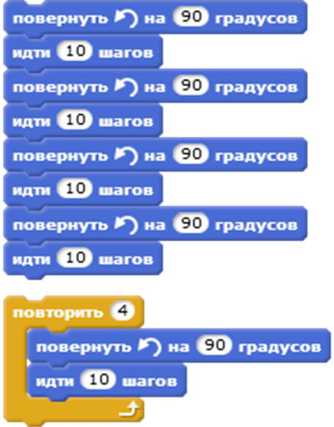
Рис.1. Переход к управляющим блокам Scratch
Представление данных. Ученики начинают использовать данные, встраивая их в скрипты - программы, управляющей действиями спрайтов. Если нужно пройти определенное количество шагов или сказать фразу, то эти количество шаги или текст фразы просто сообщаются спрайту исполнителю. Следующий уровень использования данных в среде Scratch связан с использованием численных переменных и списков (Рис. 2).
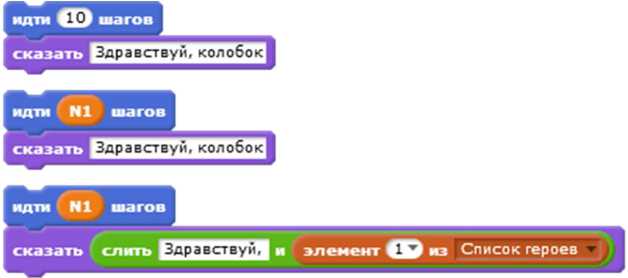
Рис.2. Переменные и списки Scratch
Абстракция. Б. Харви – создатель Snap! и один из авторов курса «Красота и радость вычислений» в качестве примера абстракции проводит аналогию между машинами и компьютерными программами. Автомобили изготовлены из гаек, болтов, металлических стержней, больших металлических блоков, резиновых или бумажных прокладок, пластиковых контейнеров для жидкостей, заклепок, проводов и т. д. Но если вы пытаетесь ремонтировать автомобиль, вы не будете думать в этих терминах; если бы вы начали так действовать, то вы бы никогда не сумели обнаружить проблему. Вместо этого вы думаете о двигателе, генераторе, топливных форсунках, тормоза, трансмиссия и т. д. Это абстракция. Прежде чем мы сможем критиковать технологии, мы должны понять, как они устроены, а абстракция - очень мощная организационная идея для описания механизма организации технологий [27]. Действия учеников в Scratch, так же как и в Лого, начинаются с использования уже готовых блоков-команд. В дальнейшем ученик учится объединять команды и создавать на их основе новые командные блоки, как это показано на рисунке 3.
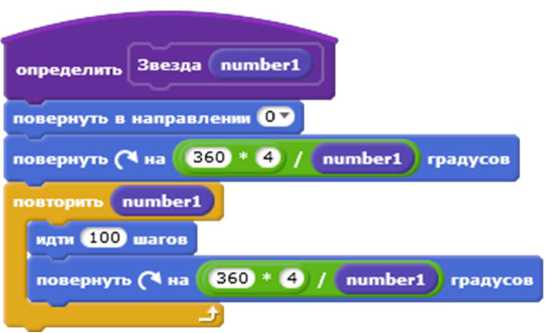
Рис.3. Создание собственных блоков в Scratch
Еще более высокий уровень абстракции связан с механизмом клонов, который позволяет создавать для отдельного спрайта его многочисленные копии (клоны). Например, мы можем создать каплю дождя или снежинку, и затем, клонируя этот объект, вызвать на экране дождь или снегопад (Рис. 4).
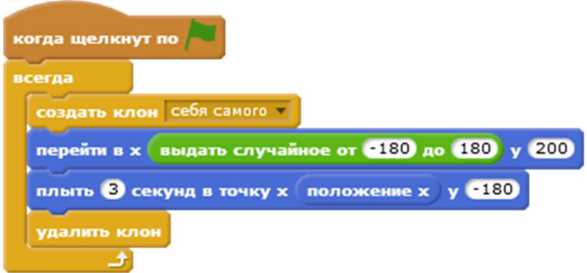
Рис.4. Клонирование объекта
Интерактивное взаимодействие. Все агенты в Scratch реагируют на нажатие клавиш клавиатуры или на нажатие кнопок манипулятора мыши. Например, простейшая программа управления перемещением спрайта выглядит следующим образом (Рис. 5).
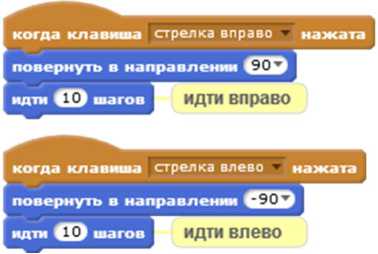
Рис.5. Интерактивность в Scratch
Синхронизация. Автор сценария управляет взаимодействием спрайтов при помощи команд «передать» сообщение] и «когда я получу» [сообщение] (Рис. 6).
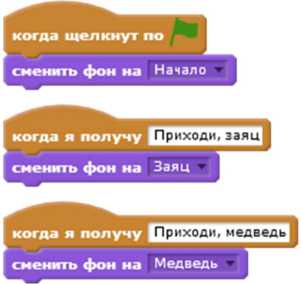
Рис.6. Передача сообщений
Параллельное выполнение сценария. Любой спрайт в среде Scratch может выполнять параллельно несколько действий: двигаться, поворачиваться, изменять цвет и т.д. Например, мы можем собрать скрипт-программу, которая будет управлять перемещением спрайта, и другой скрипт, который будет управлять изменением внешнего вида нашего спрайта. В результате одновременного выполнения указанных скриптов спрайт одновременно меняет внешний вид и положение на экране (Рис. 7). В результате параллельного выполнения скриптом у зрителя создается впечатление, что спрайт «идёт по экрану».
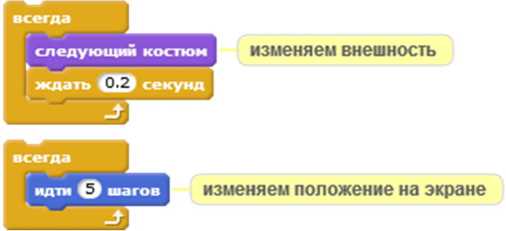
Рис.7. Параллельное выполнение сценария
Логика. Команды, связанные с логическими конструкциями, позволяют ученикам создавать динамические проекты, в которых поведение спрайтов-исполнителей зависят от ситуации. Логические конструкции очень важны при создании игр и моделей, где поведение исполнителя определяется данными из окружающей среды. Например, если спрайт «касается черного цвета», то сделать сколько-то шагов назад. Более сложные управляющие конструкции предполагают выбор - если, то ... иначе. Еще более сложная логика управления может быть реализована благодаря сочетанию условий – «И», «Или», «Не» (Рис. 8).
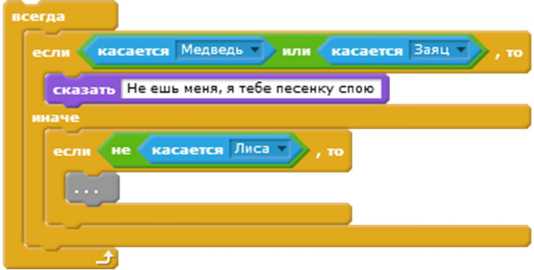
Рис.8. Использование логических конструкций
Все перечисленные концепции вычислительного мышления могут быть использованы в качестве критериев оценивания кода проектов в среде Scratch. При этом в зависимости от тех структур, которые использовались при программировании можно выделить низкий, средний и высокий уровни формирования навыков вычислительного мышления (Таблица 1).
Освоение умений вычислительного мышления в среде Scratch происходит в ходе деятельности, направленной на создание проекта - цифровой истории, игры или модели. Освоение умений является побочным результатом творческой деятельности. При этом партнеры по деятельности в ходе создания проекта могут обращаться к помощи компьютерных программ и веб-приложений.
Все проекты Scratch публикуются на сайте Приложение Dr.Scratch позволяет создателям цифровых историй указать адрес проекта и самостоятельно оценить и сертифицировать проект на основании анализа блоков, которые были использованы при создании проекта [28,29]. Возможность для участников самостоятельно контролировать не только поведение спрайтов, но и собственные достижения, используя для этого сетевые приложения, повышает степень их автономности как субъектов образования.
Таблица 1
Критериальное оценивание навыков вычислительного мышления на основании анализа блоков визуального программирования
|
Критерий |
Высокий уровень |
Средний уровень |
Низкий уровень |
|
Контроль |
В программе используются условия. Например, повторять пока не (>) |
Используются конструкции циклов. Например, повторить () и всегда [] |
Все команды программы собраны в одном блоке. Например, сказать [Да] |
|
Представление данных |
Для хранения данных используются списки. Например, (элемент (1 v) из [list v]) |
Для хранения данных используются переменные. Например, задать [X] значение (10) |
Все значения определены в тексте программы. Например, идти (10) шагов |
|
Абстракция |
В программе создаются клоны объекта. Например, создать клон [себя самого] |
Программа содержит блоки процедур, созданных автором. Например, определить РисуемДом |
Программа содержит один длинный исполняемый скрипт. Например, идти (10) шагов поднять перо |
|
Интерактивное взаимодействие |
В программе используются управляющие блоки с условиями. Например, если < [громкость] > [39]>, то |
В программе используется различные управляющие события. Например, когда клавиша [пробел] нажата |
В программе используется только первый запускающий блок. Например, когда щёлкнут по зелёному флагу |
|
Синхронизация |
Синхронизация поведения спрайтов |
Синхронизация поведения спрайтов |
Синхронизация поведения спрайтов |
|
осуществляется через их реакцию на произошедшие изменения. Например, когда фон меняется на [Лес] или ждать до ((Х) = (0)) |
осуществляется через обмен сообщениями. Например, передать [Беги] и реакция другого агента когда я получу [Беги] |
осуществляется через вставку временных пауз. Например, ждать (1) секунд |
|
|
Параллельность действий |
Параллельные действия запускаются в ответ на сообщения. Например, когда я получу [сообщение1] |
Параллельные действия запускаются в ответ на нажатия разных клавиш. Например, когда клавиша [пробел] нажата |
Все действия стартуют по первому запускающему блоку. Например, когда щёлкнут по зелёному флагу |
|
Логика |
Выбор действий зависит от совокупности условий. Например, если <<касается цвета [красный]?> и <(Х) = (0)>>, то |
Действия ветвятся в зависимости от условий. Например, если <касается цвета [красный]?>, то думать [Старт] иначе думать [Финиш] |
Действие определяется условием. Например, если <касается цвета [красный]?>, то |
Вычислительное участие
Субъектно-направленное взаимодействие приводит к изменению характеристик индивидуальных субъектов совместной деятельности. В исследованиях последних лет феномен социальной компетентности рассматривается как общее собирательное понятие, свидетельствующее об уровне социализации и включающее способность к сопереживанию, терпимость к чужому мнению, независимость, способность к коммуникации и творчеству, терпимость к конфликтным ситуациям, умение самостоятельно принимать решения [30]. Сложность освоения социальных компетенций субъектами образования связана с неопределенностью объектов той деятельности, в рамках которой может происходить формирование социальных компетенций. Появление в виртуальной среде «социальных объектов» [31], вокруг которых возникает совместная деятельность и формируются связи, играет огромное значение для образования. Социальные компетенции связаны с приобретением опыта использовать умения и результаты деятельности других людей и опытом предоставления собственных умений и ресурсов в форме, когда они пригодны для использования другими людьми при создании совместных историй, включающих множество страниц [32]. В сообществе Scratch взаимодействие участников опосредовано цифровым рассказом, который в рамках совместной деятельности является фундаментальным обучающим объектом. Социальные компетенции, необходимые для успешного участия в субъектно-направленных взаимодействиях, формируются в ходе совместной сетевой деятельности по созданию и изменению цифровых рассказов.
Все создаваемые в ходе совместной деятельности продукты могут быть повторно использованы другими участниками совместной деятельности. Можно утверждать, что методологический принцип конструкционизма в среде Scratch получил дополнительное развитие и может быть переформулирован следующим образом: Обучение происходит наиболее эффективно, если субъект образования вовлечен в создание продукта деятельности, который может обсуждаться, оцениваться и использоваться другими участниками для создания новых объектов. [33]
В сетевой среде для успешного участия в субъектно-направленных взаимодействиях субъекту совместной деятельности необходимо уметь оценивать и обсуждать объекты, созданные другими субъектами совместной деятельности; принимать оценки и суждения других участников совместной деятельности; отслеживать действия других субъектов; классифицировать предметы, созданные другими субъектами совместной деятельности. Все эти умения свидетельствуют о социальной компетентности субъекта совместной сетевой деятельности. Ж. Кафаи использует термин «вычислительное участие» (Computational participation) [11], подчеркивая что в сообществе Scratch «объекты для мышления» становятся «объектами для совместного использования». В результате того что код, становится социальным объектом программирование из когнитивного умения вычислительного мышления превращается в социальное и культурное умение, необходимое для участия в совместной сетевой деятельности.
Во всех обучающихся сообществах эффективное участие предполагает, что учащиеся самостоятельно распределяют обязанности внутри команды, работающей над проектом. В настоящее время основным инструментами для организации совместной деятельности внутри сообщества Scratch являются:
-
• студия, в которой происходит сбор и хранение проектов и материалов к проектам;
-
• ремикс – возможность создать свою копию проекта, сделанного другим участником, и внести в эту копию дополнения и улучшения;
-
• рюкзак (backpack) – возможность копировать отдельные спрайты и скрипты из чужих проектов в отдельное пространство и использовать эти объекты в своем проекте (рис. 9).
Рюкзак

Спрайт Спрайт Спрайт Спрайт
Спрайт) 8 Спрайт17 Слрайт12 СпрайтЮ
Рис.9. Спрайты в рюкзаке
Умения, связанные с вычислительным участием, и критерии оценивания этих умений, гораздо менее разработаны, чем умения и критерии в сфере вычислительного мышления. Исходя из открытых данных, которые доступны для участников сообщества Scratch, мы можем предложить следующие критерии и характеризующие их показатели:
• Готовность делиться своим кодом – характеризуется числом проектов, которыми участник поделился на сайте и числом ремиксов, которые были сделаны на основе этих проектов;
-
• Готовность использовать чужой код – характеризуется числом проектов, которые участник отметил как «избранные» и числом ремиксов, которые участник создал на базе чужих проектов
-
• Расположенность к сотрудничеству – характеризуется числом тех членов сообщества, кто подписался новости о действиях данного участника
-
• Заинтересованность в сотрудничестве - – характеризуется числом тех членов сообщества, на новости о действиях которых подписался данный участник.
-
• Готовность организовывать пространство совместной деятельности – характеризуется числом студий, в которых участник исполняет роль куратора или
- приглашенного менеджера.
Это неполный перечень показателей. Безусловно, большое значение имеет описание собственных умений и интересов в профайле, описание и комментирование студий, комментирование кода внутри спрайтов и т.д. Однако это качественные характеристики, и они в настоящее время не могут быть переданы от людей к компьютерным программам. Что же касается перечисленных в таблице 2 количественных показателей, то уже сегодня в исследовательских версиях Scratch существуют процедуры, которые позволяют извлекать облачные данные, хранимые на сервере Scratch и использовать их в исследовательских проектах учащихся. Пример такого использования приведен на рисунке 10.
когда щелкнут по задать SharedProjects значение
о
задать FavoriteProjects
о
задать Follower значение
о
задать Following □ значение
о
задать Like
задать CuratedStudios Я значение
говорить слить
Число опубликованных проектов =
и Sha red Projects в течение е секунд
говорить слить
Число избранных проектов =
FavoriteProjects в течение е секунд
говорить слить
Количество подписчиков =
и Follower в течение е секунд
говорить слить
Количество тех, на кого подписан =
и Following
течение о секунд
говорить слить
Число лайков =
Like в течение 0 секунд
говорить слить
Число студий =
и CuratedStudios
секунд
Рис.10. Определение показателей отдельного участника в среде Scratch
Показательно, что в области учебной аналитики и использования больших данных происходит постепенная передача контроля от исследователей и педагогов [34–36] к самим учащимся, которым предлагается роль исследователей [37–39]. Знакомство школьников и учителей с наукой о сетях может начинаться с исследования карт, которые отображают их собственную деятельность в учебных сообществах. Преимущество такого подхода заключается в том, что сетевой подход используется для понимания ситуаций, в которые вовлечены и школьники, и учителя. Таким образом, наука о сетях показывает свои возможности на близком для учеников и учителям материале, и субъекты образования становятся исследователями своей собственной деятельности.
Необходимо отметить, что в настоящее время Scratch не является единственной средой, где осуществляются эксперименты по организации совместной деятельности, основанной на создании и совместном использовании объектов. Сравнение известных учебных сообществ, близких теории конструкционизма, позволяет увидеть, что практически все они используют идею цикла или спирали действий, которые совершают субъекты над объектами совместной деятельности.
-
• В сети Globaloria учащиеся выполняют действия над компьютерными играми: Играй -> Планируй -> Разрабатывай прототип -> Программируй -> Публикуй [40]. Созданный объект может быть обсужден внутри специализированного википортала и в дальнейшем использован другими участниками при создании их собственных программ
-
• В сообществе NetLogo разработчики моделей совершают над ними следующую последовательность действий: Создай -> Запусти -> Поделись -> Прокомментируй -> Видоизмени -> Создай новые версии [41]. Автор модели может пригласить других участников к совместному изменению модели. При этом участники могут выполнять различные роли в команде.
-
• В сети StarLogo TNG существуют два взаимосвязанных цикла действий, которые разработчики совершают над моделью, как объектом деятельности: Цикл исследования: Наблюдай/Собирай данные -> Формулируй вопросы -> Проверяй/Экспериментируй. Цикл дизайна: Проектируй -> Создавай -> Проверяй/Экспериментируй -> Проектируй [42]
-
• В сети Looking Glass создатели трехмерных моделей на языке Alice совершают следующие действия над моделями: Создай -> Анимируй -> Выдели модуль -> Поделись [43]. Платформа позволяет выделить в ремикс поведение отдельного объекта-персонажа и затем передать это поведение другому персонажу.
-
• В сети CloudWorks учителя совершают действия над картами сценариями учебного процесса (объект в среде CompendiumLD): Найди -> Поделись -> Обсуди [44]
-
• В сети социальных исследований WebGrid: исследователи совершают следующие действия с репертуарными решетками: Покажи -> Выдели кластеры -> Построй карту -> Сравни [45]
Вычислительная рефлексия
Коллективная субъектность формируется и возрастает благодаря взаимодействиям, которые приводят к росту взаимосвязанности и взаимозависимости индивидов в группе, к росту способности группы проявлять совместные формы активности, выступать в качестве единого субъекта деятельности по отношению к другим группам, к росту способности группы к саморефлексии, в результате которой формируются чувства «Мы» и образ-Мы [46]. Исходя из этого, ключевым умением, необходимым коллективному субъекту совместной сетевой деятельности для участия в организационно-направленных взаимодействиях, является умение групповой саморефлексии и формирования образа «Мы». Под групповой рефлексивностью обычно понимается способность группы к рефлексии - анализу своей деятельности и отношений, которые складываются между участниками совместной деятельности [47,48]. М. Вест отмечает, что наряду с рефлексивностью, направленной на решение задачи, существует социальная рефлексивность группы, то есть склонность ее членов к анализу сложившихся между ними отношений [49]. В отечественной психологии рефлексия предстает как особый вид кооперации, механизм развития совместной деятельности, позволяющий ее участникам порождать единый, нормативный смысл ситуации. Исследования групповой рефлексивности свидетельствуют о том, что она выступает одним из важнейших факторов эффективности совместной деятельности [50,51]. Системные компетенции связаны с приобретением опыта системного мышления, анализа сетевых ценностей и сетевых структур, способностью и готовностью участвовать в проектах совместной сетевой деятельности. Понимание организации, как правило, начинается с описания структуры, т.е. того, как разделен в организации труд, распределена власть и влияние. Это описание структуры формализуется в виде схемы, которая описывает желаемое состояние, но ничего не говорит о действительном статусе какого-либо человека, его взаимодействии с коллегами.
Основоположник психологической теории компетентности и автор книги «Компетентность в современном обществе» [52] Дж. Равен в своих современных исследованиях уделяет первоочередное внимание системному мышлению и формированию системных компетенций, все чаще обращаясь к идеям социокибернетики, которая представляет собой применение системной динамики и системно-динамических моделей к исследованию социальных процессов [53—55] . Ключевое значение в формировании компетенций имеет объект деятельности, который задает целеполагание, форму и сценарий деятельности. Определяя пути формирования системного мышления и системных компетенций, необходимо определить образовательный объект деятельности, в ходе которой у субъектов образования формируется системное мышление. Деятельность субъектов образования должна быть связана с изучением системного объекта, который помогает им понять функционирование системы совместной деятельности. Таким фундаментальным системным образовательным объектом могут служить статические или динамические модели систем различного рода — диаграммы, социограммы, системограммы, возможности для построения и получения которых в последние годы необычайно увеличились благодаря информационным технологиям.
Внутри сообщества Scratch средством, поддерживающим процесс групповой рефлексии, является инструмент дерева ремиксов. Для каждого проекта этот инструмент позволяет увидеть проекты, которые были созданы, как его видоизмененные копии. На рисунке 11 представлено дерево ремиксов для проектов учебной студии «Путешествие в Сомовку».
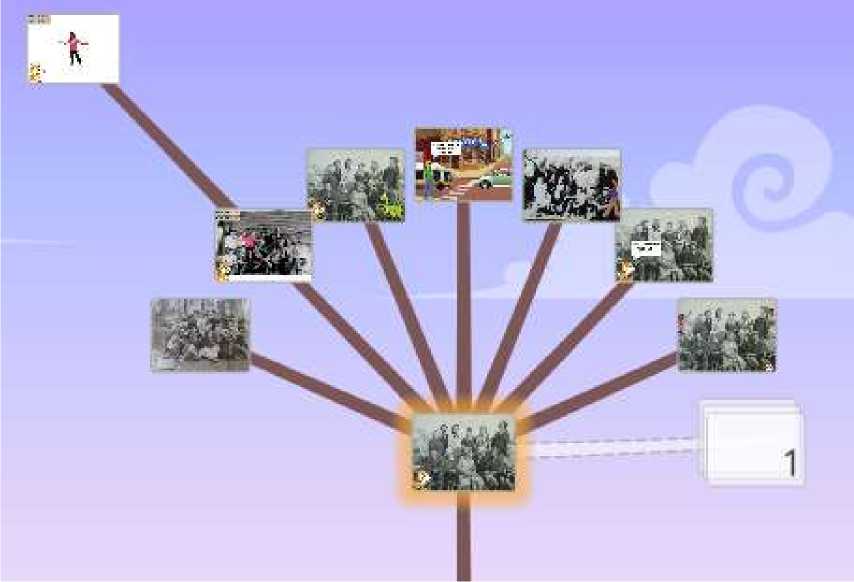
Рис.11. Дерево ремиксов студии «Путешествие в Сомовку»
Субъекты деятельности могут не только совместно изменять объекты, но и все эти изменения записываются в журнал изменений, а данные этого журнала могут использоваться для построения карты совместной сетевой деятельности субъектов образования. Эта карта позволяет оценивать образовательную социотехническую систему по показателям, характеризующим совместную сетевую деятельность. Совместная сетевая деятельность субъектов образования является сложной адаптивной системой, для понимания которой необходимы специальные инструменты. Такими инструментами, позволяющими получить карты и схемы связей между субъектами совместной сетевой деятельности, являются сетевые модели, основанные на данных о действиях субъектов и изменении объектов совместной деятельности.
Различные типы современных социотехнических систем, в которых реализуется совместная деятельность участников, сохраняют в журнал записи обо всех действиях участников. В общем виде история, сохраненная в журнале, может быть представлена как запись игровой партии, состоящей из множества ходов, каждый из которых содержит следующие три обязательных элемента:
Субъект деятельности | Объект деятельности| Вид деятельности
Различные формы совместной сетевой деятельности (совместное редактирование документа, создание и комментирование записей в блоге, создание и совместное редактирование статей в вики и т.п.) могут быть сведены к единой схеме, которая позволяет анализировать и сравнивать деятельность участников. Перефразируя утверждение Латура [56, с. 391] можно утверждать, что как только каждое редактирование страницы в вики; каждый ремикс и каждая модификация программы в Scratch, Alice, StarLogo Nova, NetLogo, каждое изменение, оценивание или обсуждение карты учебного дизайна в CloudWorks, каждое заполнение и видоизменение решетки репертуарных конструктов в WebGrid начинает сопровождаться записью в электронном журнале, все субъекты образования получают возможность усовершенствовать процесс обучения. Возможность критериального оценивания совместной сетевой деятельности при помощи социограмм была реализована ранее для образовательной вики-системы Letopisi.org [15]. При разработке таблицы критериального оценивания совместной сетевой деятельности использовались следующие критерии: продуктивность, связанность, сплоченность и устойчивость.
Поскольку для всех систем продуктивной сетевой деятельности справедливы общие принципы, то мы предположили, что возможно использовать сходный аппарат и для построения социограмм на базе анализа тех действий, которые совершают участники сообщества Scratch (скретчеры) в рамках студий, созданных для совместной работы. При этом мы полагаем, что студии Scratch по своим функциям аналогичны категориям MediaWiki. Критерии и показатели качества групповой деятельности в студии Scratch представлены в таблице (Таблица 2).
Таблица 2
Критериальное оценивание структуры Scratch студии
|
Критерий |
Высокий уровень |
Средний уровень |
Низкий уровень |
|
Продуктивность |
Граф содержит множество созданных участниками объектов. |
Число объектов примерно равно числу участников. |
Число объектов значительно меньше числа участников. |
|
Связанность |
Все субъекты и объекты деятельности объединены в одном графе. |
Участники и объекты деятельности объединены в небольшое (3 - 4) число компонентов. |
Граф студии разбит на множество несвязанных компонентов. |
|
Сплоченность |
На социограмме представлена одна сплоченная группа (клика), в которой все участники связаны друг с другом через страницы. |
Участники образуют несколько малочисленных групп. |
На социограмме практически нет групп, что говорит об отсутствии взаимодействия. |
|
Устойчивость |
На социограмме представлены несколько ключевых игроков, связи которых обеспечивают устойчивость совместной деятельности. |
На социограмме представлены 2 – 3 участника, удаление которых приведет к тому, что граф рассыпается на несвязанные компоненты. |
На социограмме есть единственный ключевой игрок, через которого идут все информационные процессы. Удаление этого узла разрушает сеть. |
В экспериментальных целях мы собрали данные о действиях участников в нескольких Scratch студиях и на основании этих данных получили социограммы совместной деятельности. Пример такой социограммы приведен на рисунке 12. Фигурки обозначают участников-скретчеров, листы кода – проекты. Сплошная линия от скретчера к проекту означает, что данный скретчер является автором проекта. Пунктирная линия обозначает, что скретчер комментировал проект.
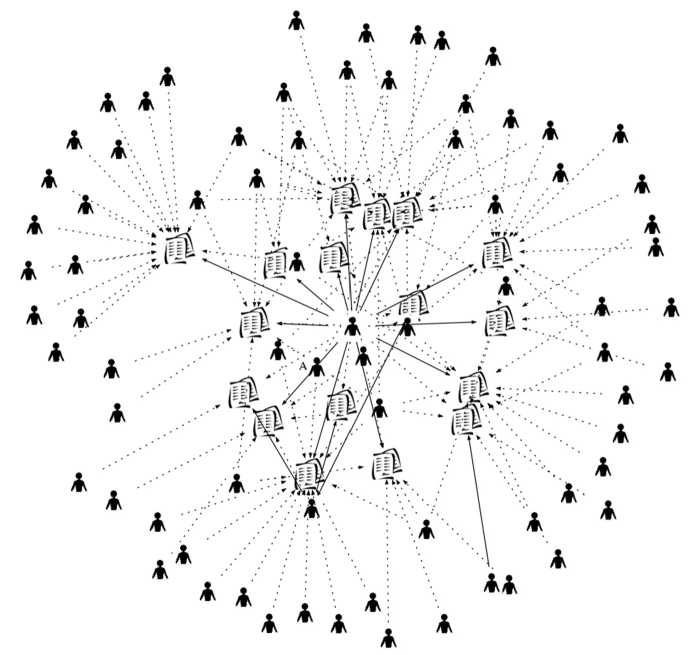
Рис.12. Социограмма студии Scratch
На социограмме мы видим, что данная студия характеризуется средней продуктивностью, высокой связанностью, сплоченностью и низкой устойчивостью. Удаление центрального скретчера и его проектов приведет к тому, что граф студии рассыплется на множество несвязанных участников.
Заключение
Взаимосвязанное развитие направлений вычислительной педагогики может быть обобщено в одном предложении: «Обучение происходит наиболее эффективно, если субъект образования вовлечен в создание продукта деятельности, который может обсуждаться, оцениваться и использоваться другими участниками для создания новых объектов, а данные о взаимодействиях субъектов образования могут быть представлены в виде карты». Продуктом совместной сетевой деятельности является «цифровая история (рассказ, нарратив), которая может принимать различные формы (текст, презентация, видеоигра, анимация, театральный спектакль, модель, сценарий будущего, нормативно-правовой акт и т.п.) [16,57]. Принципиальное значение имеет тот, что цифровая история и составные элементы этой истории могут использоваться другими участниками совместной деятельности при создании новых историй.
Поскольку мы находимся в самом начале объединения вычислительного мышления, участия и рефлексии, то интерес представляет сравнение различных ситуаций, в которых происходит формирование умений, необходимых для успешного функционирования в составе коллективного субъекта, которым может быть футбольная команда, школьная или корпоративная вики, школьная или домашняя скретч-студия, шахматная или какая-то другая школа единоборств. Примеры таких ситуаций приведены в таблице 3. Вычислительная техника добавляет дополнительные возможности и расширяет деятельность во всех ячейках таблицы 3, независимо от того, осуществляется деятельность в цифровой среде или нет. Наиболее ярко возможности вычислительной техники по дополнению способностей группы к коллективной рефлексии проявляются сегодня при анализе футбольных матчей, когда игроки и тренеры действуют не только как мастера владения мячом или мастера тактических построений, но и как специалисты по системной динамике [58–60]. В данной работе мы рассматриваем развитие вычислительной педагогики в среде и сообществе Scrtatch, поскольку внутри этого сообщества уже сейчас компьютерные программы усиливают и поддерживают индивидуальные и коллективные способности мышления, участия и рефлексии. Найденные внутри сообщества Scratch пути развития вычислительной педагогики могут быть перенесены в миры других образовательных сообществ. В первую очередь это будет происходить и уже происходит в сообществах с общей концепцией обучения, основанной на конструкционизме.
Таблица 3
Уровни совместной деятельности для различных практик
|
Поля и типы деятельности |
Игровое поле (футбол, баскетбол, волейбол) |
Поле настольных игр (шахматы, шашки, го) |
Поле сетевой деятельности (вики, GitHub, Alice, Scratch) |
|
Индивидуальный (предметнонаправленные взаимодействия) |
Быстро бегать, попадать по мячу, обводить противников, индивидуальная техника владения мячом - объектом деятельности |
Знать правила, дебюты, эндшпили, узнавать повторяющиеся игровые паттерны, просчитывать варианты |
Вычислительное мышление - уметь кодировать, создавать игры, цифровые истории, модели. |
|
Коллективный (субъектнонаправленные взаимодействия) |
Отдавать мяч, принимать мяч, видеть партнеров, открываться |
Уметь читать, записывать, обсуждать партии. Уметь заимствовать идеи из записей чужих партий. Уметь делать ремиксы |
Вычислительное участие - уметь обсуждать, использовать проекты других участников, делать ремиксы, использовать рюкзак, делиться своими проектами, организовывать деятельность других участников |
|
Системный (организационнонаправленные взаимодействия |
Понимать сетевую динамику игры, анализировать игровые диаграммы и менять организацию |
Рассматривать свою школу, как коллективного субъекта деятельности |
Вычислительная рефлексия - уметь анализировать данные о совместной деятельности - викиграммы, деревья ремиксов. |
|
игры на основе анализа этих диаграмм |
Список литературы Вычислительная педагогика: мышление, участие и рефлексия
- Berry D. The computational turn: Thinking about the digital humanities//Culture Machine. 2011. Vol. 12.
- Yasar O., Maliekal J. Computational Pedagogy: A Modeling and Simulation Approach//Computing in Science Engineering. 2014. Vol. 16, № 3. P. 78-88.
- Yasar O. Computational Pedagogical Content Knowledge (CPACK): Integrating Modeling and Simulation Technology into STEM Teacher Education. Association for the Advancement of Computing in Education (AACE), 2015. P. 3514-3521.
- Dorogovt︠s︡ev S.N., Mendes J.F.F. Evolution of networks: from biological nets to the Internet and WWW. Oxford University Press, 2003. 278 p.
- Ostrom E. Governing the commons: the evolution of institutions for collective action. Cambridge University Press, 1990. 302 p.
- Beecher K. Computational Thinking. BCS, The Chartered Institute for IT, 2017. 306 p.
- Bers M.U. Coding as a Playground: Programming and Computational Thinking in the Early Childhood Classroom. 1 edition. New York, NY: Routledge, 2017. 196 p.
- Williams H. No Fear Coding: Computational Thinking Across the K-5 Curriculum. Portland, Oregon: International Society for Technology in Education, 2017. 176 p.
- Wing J.M. Computational Thinking//Commun. ACM. 2006. Vol. 49, № 3. P. 33-35.
- Wing J.M., Stanzione D. Progress in Computational Thinking, and Expanding the HPC Community//Commun. ACM. 2016. Vol. 59, № 7. P. 10-11.
- Kafai Y.B., Burke Q. Connected Code: Why Children Need to Learn Programming. MIT Press, 2014. 200 p.
- Fields D.A., Kafai Y.B., Giang M.T. Youth Computational Participation in the Wild: Understanding Experience and Equity in Participating and Programming in the Online Scratch Community//ACM Trans. Comput. Educ. 2017. Vol. 17, № 3. P. 15:1-15:22.
- Fields D., Giang M., Kafai Y. Programming in the wild: Patterns of Computational Participation in the Scratch Online Social Networking Forum. 2014. P. 2-11.
- Патаракин Е.Д., Катков Ю.В. Использование викиграмм для поддержки совместной сетевой деятельности//Образовательные технологии и общество (Educational Technology & Society). 2012. Vol. 15, № 2. P. 536-552.
- Patarakin E.D. Wikigrams-Based Social Inquiry//Digital Tools and Solutions for Inquiry-Based STEM Learning. IGI Global, 2017. Vol. 1. P. 112-138.
- Patarakin E. et al. Management of Collaboration Based on the Analysis of Social Structure//Chugunov A., Bolgov R., Kabanov Y., Kampis G., Wimmer M. (eds) Digital Transformation and Global Society. DTGS 2016. Communications in Computer and Information Science. Cham: Springer International Publishing, 2016. Vol. 674. P. 344-349.
- Журавлев А.Л. Психология совместной деятельности. Институт психологии РАН, 2005. 640 p.
- Kestenbaum D. The challenges of IDC: what have we learned from our past?//Commun. ACM. 2005. Vol. 48, № 1. P. 35-38.
- Harel I., Papert S. Constructionism: research reports and essays, 1985-1990. Ablex Pub. Corp., 1991. 540 p.
- Minsky M. Introduction to LogoWorks//LogoWorks: Challenging Programs in Logo/ed. Solomon C., Minsky M., Harvey B. McGraw-Hill Osborne Media, 1986. P. 388.
- Resnick M. Lifelong Kindergarten: Cultivating Creativity Through Projects, Passion, Peers, and Play. MIT Press, 2017.
- Engelbart D.C. Computer-supported cooperative work: a book of readings/ed. Greif I. San Francisco, CA, USA: Morgan Kaufmann Publishers Inc., 1988. P. 35-65.
- Патаракин Е.Д. Освоение медиакультуры через учебные игры с маленькими кирпичиками знаний//Медиакультура новой России: методология, технологии, практики. Екатеринбург Москва: Академический проект, 2007. P. 436-444.
- Патаракин Е.Д. Педагогический дизайн социальной сети Scratch//Образовательные технологии и общество (Educational Technology & Society). 2013. № 2. P. 505-528.
- Meerbaum-Salant O., Armoni M., Ben-Ari M. (Moti). Learning Computer Science Concepts with Scratch//Proceedings of the Sixth International Workshop on Computing Education Research. New York, NY, USA: ACM, 2010. P. 69-76.
- Garcia D., Harvey B., Barnes T. The Beauty and Joy of Computing//ACM Inroads. 2015. Vol. 6, № 4. P. 71-79.
- Harvey B. Professor Harvey’s Introduction to Abstraction | Computing Portal . URL: http://www.computingportal.org/node/7716 (accessed: 04.04.2018).
- Moreno-León J., Robles G. Dr. Scratch: A Web Tool to Automatically Evaluate Scratch Projects//Proceedings of the Workshop in Primary and Secondary Computing Education. New York, NY, USA: ACM, 2015. P. 132-133.
- Moreno-León J. et al. On the Automatic Assessment of Computational Thinking Skills: A Comparison with Human Experts//Proceedings of the 2017 CHI Conference Extended Abstracts on Human Factors in Computing Systems. New York, NY, USA: ACM, 2017. P. 2788-2795.
- Царапкина Ю.М., Воробьева К.П. Развитие социальных компетенций студентов при использовании метода модерации//Историческая и социально-образовательная мысль. 2014. № 3 (25). P. 148-152.
- Engeström J. Why some social network services work and others don’t -Or: the case for object-centered sociality//Zengestrom. 2005.
- Patarakin Y., Shilova O. Concept of Learning Design for Collaborative Network Activity//Procedia -Social and Behavioral Sciences. 2015. Vol. 214. P. 1083-1090.
- Патаракин Е.Д. Педагогический дизайн совместной сетевой деятельности субъектов образования. Москва: Московский городской педагогический университет, 2017. 319 p.
- Aivaloglou E., Hermans F. How Kids Code and How We Know: An Exploratory Study on the Scratch Repository//Proceedings of the 2016 ACM Conference on International Computing Education Research. New York, NY, USA: ACM, 2016. P. 53-61.
- Aivaloglou E. et al. A Dataset of Scratch Programs: Scraped, Shaped and Scored//Proceedings of the 14th International Conference on Mining Software Repositories. Piscataway, NJ, USA: IEEE Press, 2017. P. 511-514.
- Hill B.M., Monroy-Hernández A. A longitudinal dataset of five years of public activity in the Scratch online community//Scientific Data. 2017. Vol. 4. P. 170002.
- Dasgupta S. Learning with data: a toolkit to democratize the computational exploration of data: Thesis. Massachusetts Institute of Technology, 2012.
- Hautea S., Dasgupta S., Hill B.M. Youth Perspectives on Critical Data Literacies. ACM Press, 2017. P. 919-930.
- Dasgupta S., Hill B.M. Scratch Community Blocks: Supporting Children As Data Scientists//Proceedings of the 2017 CHI Conference on Human Factors in Computing Systems. New York, NY, USA: ACM, 2017. P. 3620-3631.
- Reynolds R., Caperton I.H. Comparison of Middle School, High School and Community College Students’ Wiki Activity in Globaloria-West Virginia: (Pilot Year-two)//Proceedings of the 5th International Symposium on Wikis and Open Collaboration. New York, NY, USA: ACM, 2009. P. 29:1-29:2.
- Lerner R.M. Agent-Based Modeling as a Social Activity. NORTHWESTERN UNIVERSITY, 2014. 229 p.
- Klopfer E. et al. The Simulation Cycle: Combining Games, Simulations, Engineering and Science Using StarLogo TNG//E-Learning and Digital Media. 2009. Vol. 6, № 1. P. 71-96.
- Kelleher C., Pausch R. Using Storytelling to Motivate Programming//Commun. ACM. 2007. Vol. 50, № 7. P. 58-64.
- Galley R. et al. Cloudworks as a ‘pedagogical wrapper’ for LAMS sequences: supporting the sharing of ideas across professional boundaries and facilitating collaborative design, evaluation and critical reflection. Oxford, 2010.
- Gaines B.R., Shaw M.L.G. Sociocognitive Inquiry//Social Network Mining, Analysis, and Research Trends: Techniques and Applications/ed. Ting I.-H., Hong T.-P., Wang L.S.-L. IGI Global, 2012. P. 35-55.
- Журавлев А.Л. Коллективный субъект: основные признаки, уровни и психологические типы//Психологический журнал. 2009. № 5. P. 72-80.
- Журавлев А.Л., Нестик Т.А. Основные подходы и перспективы исследований групповой рефлексивности в организационной психологии//Психология в экономике и управлении. 2011. № 2. P. 6-15.
- Журавлев А.Л., Нестик Т.А. Групповая рефлексивность: основные подходы и перспективы исследований//Психологический журнал. 2012. Vol. 33, № 4. P. 27-37.
- West M.A. Reflexivity and work group effectiveness: A conceptual integration//Handbook of work group psychology/ed. West M.A. Chichester, UK: Wiley, 1996. P. 555-579.
- Carter S.M., West M.A. Reflexivity, Effectiveness, and Mental Health in BBC-TV Production Teams//Small Group Research. 1998. Vol. 29, № 5. P. 583-601.
- Gurtner A. et al. Getting groups to develop good strategies: Effects of reflexivity interventions on team process, team performance, and shared mental models//Organizational Behavior and Human Decision Processes. 2007. Vol. 102, № 2. P. 127-142.
- Равен Д. Компетентность в современном обществе. Выявление, развитие и реализация. Москва: Когито-Центр, 2002. 396 p.
- Raven J. Emergence//pepsi. 2014. Vol. 19, № 1-2. P. 91-107.
- Raven J., Gallon L. Conceptualising, Mapping, and Measuring Social Forces//Journal of Sociocybernetics. 2010. P. 73-110.
- Raven J., Stephenson J. Competence in the learning society. 2003.
- Латур Б. Наука в действии: следуя за учеными и инженерами внутри общества. Издательство Европейского университета в Санкт-Петербурге, 2013. 413 p.
- Patarakin E., Burov V., Remorenko I. Scaffolding Educational Community of Practice Using Visual Storytelling//Proceedings of the 10th International Conference on Theory and Practice of Electronic Governance. New York, NY, USA: ACM, 2017. P. 355-358.
- Rahnamai Barghi A. Analyzing Dynamic Football Passing Network: Thesis. Université d’Ottawa/University of Ottawa, 2015.
- Peña J.L., Touchette H. A network theory analysis of football strategies//arXiv:1206.6904 . 2012.
- Gonçalves B. et al. Exploring Team Passing Networks and Player Movement Dynamics in Youth Association Football//PLoS One. 2017. Vol. 12, № 1.


